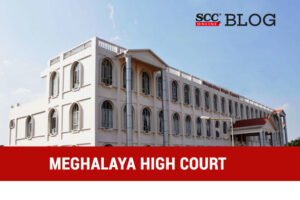Meghalaya High Court: In a writ petition filed under Article 226 of Constitution of India against the order issued by BSF Commandant, wherein, the petitioner was dismissed from duty, a Single-Judge Bench of W. Diengdoh, J, allowed the petition and set aside the order issued by the BSF Commandant, on grounds that the action of the competent authority to dismiss the petitioner from service was an arbitrary act and not in fair play.
Factual Matrix:
In the matter at hand, the petitioner had joined the Border Security Force (‘BSF’) as a Constable on 20.04.2013. After solemnisation of his marriage, First Information Report (‘FIR’) was registered due to marital discord which caused financial and physical difficulties for the petitioner. During such period, the petitioner suffered from mental depression which led to his unintentional abstention from duty. Subsequently, the competent authority had instituted a Court of Inquiry and dismissed the petitioner from service on grounds of abstention during the inquiry. The petitioner appealed before the competent authority against the dismissal order, however, the appeal was rejected by the authority. Aggrieved by the dismissal order and rejection of the appeal by the competent authority, the petitioner filed an application to set aside the dismissal order before the Court.
Issue: Whether issuance or non-issuance of the Show Cause Notice by the competent authority has violated the rules of natural justice?
Observation and Analysis
The Court referred to the Rule 173(8) of Border Security Force Rules, 1969 (‘BSF Rules’) which clearly provides that the Court of Inquiry before giving an opinion will ensure that the delinquent be given an opportunity to cross-examine any witnesses who have given evidence against him and said that in the petitioner’s case, he was not given any such opportunity to defend himself and cross-examine the witnesses. The Court noted that in the findings of the Presiding Officer, the fact that the petitioner was absent from the proceedings before the Court of Inquiry was never noted, therefore, the Court said that it can be assumed that prejudice was caused to the petitioner.
Further, the Court noted that the Show Cause Notice was issued to the petitioner on 27-08-2015, however, no other relevant documents were attached along with the show cause notice. The Court said that the petitioner denied having ever received the said Show Cause Notice, even if he had received the same, it would be sans the relevant documents, which indeed is violation of the principles of natural justice.
The Court said that the ‘rule of fair hearing’ or ‘Audi Alterum Partem’ is well- recognized and often repeated principle of natural justice which has been applied to ensure that no person can be condemned or punished by a superior authority without having a fair chance of being heard. Further, the Court said that one of the components of this rule is ‘issuance of notice’ upon receipt of which, the same would be considered that proper and adequate opportunity has been given to the party concerned to enter appearance in any proceeding, be it before the court or a competent authority . However, the petitioner was not served with a proper show cause notice and, therefore, a proper defence opportunity was not provided to him. Thus, the action of the competent authority to dismiss the petitioner from service was an arbitrary act and not in fair play.
Thus, the Court allowed the petitioner’s prayer, and the impugned order of the competent authority was set aside and, also, the authority was directed that any disciplinary action contemplated to be taken by the BSF authority must be done in accordance with proper procedure after affording the best opportunity to the petitioner to defend himself.
[Shashi Kumar Rajak v. Union of India, 2023 SCC OnLine Megh 166, Judgment dated: 11-04-2023]
Advocates who appeared in this case :
For the Petitioner: Advocate S. Chakrawarthy and Advocate E. Slong;
For the Respondent: Advocate R. Debnath.

